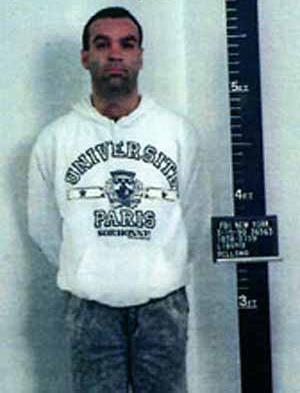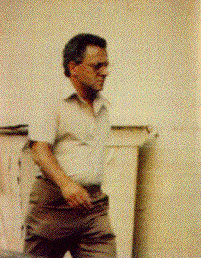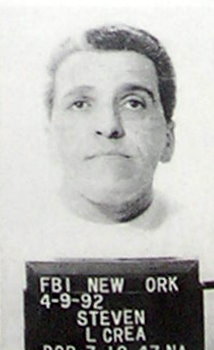
Vincent Louis Gigante, also known as "The Chin", was an American mobster who was boss of the Genovese crime family in New York City from 1981 to 2005. Gigante started out as a professional boxer who fought in 25 matches between 1944 and 1947. He then started working as a Mafia enforcer for what was then the Luciano crime family, forerunner of the Genovese family. Gigante was one of five brothers; three of them, Mario, Pasquale, and Ralph, followed him into the Mafia. Only one brother, Louis, stayed out of the crime family, instead becoming a Catholic priest. Gigante was the shooter in the failed assassination of longtime Luciano boss Frank Costello in 1957. In 1959, he was sentenced to seven years in prison for drug trafficking, and after sharing a prison cell with Costello's rival, Vito Genovese, Gigante became a caporegime overseeing his own crew of Genovese soldiers and associates who operated out of Greenwich Village.

The Genovese crime family, also sometimes referred to as the Westside, is an Italian-American Mafia crime family and one of the "Five Families" that dominate organized crime activities in New York City and New Jersey as part of the American Mafia. They have generally maintained a varying degree of influence over many of the smaller mob families outside New York, including ties with the Philadelphia, Patriarca, and Buffalo crime families.
The Mafia Commission Trial was a criminal trial before the United States District Court for the Southern District of New York in New York City, United States, that lasted from February 25, 1985, until November 19, 1986. Using evidence obtained by the Federal Bureau of Investigation, 11 organized crime figures, including the heads of New York City's "Five Families", were indicted by United States Attorney Rudolph Giuliani under the Racketeer Influenced and Corrupt Organizations Act (RICO) on charges including extortion, labor racketeering, and murder. Eight of them were convicted under RICO, and most were sentenced to 100 years in prison on January 13, 1987, the maximum possible sentence under that law.
Peter DeFeo, also known as "Philie Aquilino", was a New York mobster who became a caporegime with the Genovese crime family.
Vincent DiNapoli was a caporegime in the Genovese crime family, involved in labor racketeering. DiNapoli is best known for creating a cartel in the 1970s that controlled the price of drywall in New York City.

Liborio Salvatore Bellomo is an American mobster and boss of the Genovese crime family. He served in the 116th Street Crew of Saverio "Sammy Black" Santora and was initiated in 1977. His father was a soldier and close to Anthony "Fat Tony" Salerno. In 1990, Kenneth McCabe, then-organized crime investigator for the United States attorney's office in Manhattan, identified Bellomo as "acting boss" of the crime family following the indictment of Vincent Gigante in the "Windows Case". In June 1996, Bellomo was indicted on charges of extortion, labor racketeering and for ordering the deaths of Ralph DeSimone in 1991 and Antonio DiLorenzo in 1988; DeSimone was found shot 5 times in the trunk of his car at LaGuardia Airport and DiLorenzo was shot and killed in the backyard of his home. Since around 2016, Bellomo was recognised, most likely, to be official boss of the Genovese family.

James Ida also known as "Little Guy" is an American mobster and former consigliere of the Genovese crime family.

Steven L. "Stevie" Crea is an American mobster and former underboss of the Lucchese crime family. In August 2020, he was sentenced to life imprisonment for murder and racketeering.
Ralph "Little Ralphie" Scopo Sr. was a New York mobster with the Colombo crime family who became a powerful labor racketeer. He was the father of Colombo mobsters Joseph Scopo and Ralph Scopo Jr., and the grandfather of Joseph Scopo Jr. and Ralph Scopo III.
Dominick "Big Dom" LoFaro (1928-2003) was a small-time gambler who later became a government undercover informant.
Louis DiNapoli is a New York City mobster and soldier in the Genovese crime family. DiNapoli grew up in the East Harlem section of Manhattan and became a made member of the Genovese family in the early 1980s, joining the 116th Street Crew, which was headed by his older brother Vincent DiNapoli. The crew was heavily involved in labor racketeering in the N.Y.C. District Council of Carpenters, and used its influence to extort money from New York construction companies and contractors.
Rosario "Ross" Gangi is a New York City mobster and former captain in the Genovese crime family who became involved in labor racketeering and white collar crime.
Vincent "Fish" Cafaro was a mobster and protegee of Anthony "Fat Tony" Salerno, a top lieutenant in the Genovese crime family, until becoming a government informant and witness.
Mario "the shadow" Gigante was an American mobster in New York City who served as caporegime for the Genovese crime family. He was the elder brother of late family boss Vincent "The Chin" Gigante.
Eugene Hanley was an American labor leader in New York City, and an associate of the Genovese crime family. Hanley took over as President of Local 257 of the New York City District Council of Carpenters for his father-in-law, a Genovese mobster named Will Graziano. Hanley and Local Vice-President Attilio Bitondo extorted building contractors operating in Manhattan in conjunction with Local shop steward Carmine Fiore, a Gambino crime family soldier, and other organized crime figures linked to the Gambino, Genovese and Colombo crime families. The men ordered beatings for those contractors who refused to back in, but typically, violence wasn't needed.
Giuseppe "Pino" Schifilliti is a former prominent member of the DeCavalcante crime family since the 1980s, heavily involved in labor racketeering and extortion activities.
Giovanni "John the Eagle" Riggi was a New Jersey mobster and member of the DeCavalcante crime family since the 1940s, before the family had acquired its name. Riggi was the leader of the "Elizabeth crew" in the family when he was a Caporegime. He had been the acting boss during the 1970s and became the official boss around 1982. Riggi was incarcerated at the Federal Medical Center (FMC) Devens, Massachusetts, on extortion and labor racketeering convictions. He was released on November 27, 2012.




